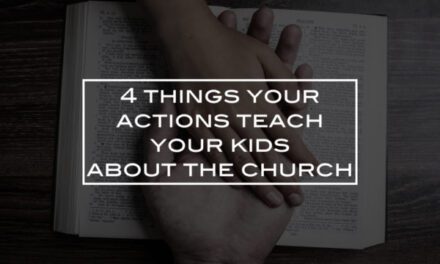There’s been much discussion recently among my online ministry friends about the state of the church. Are we doing well, or are we dying out? Is the church in America healthy, or is she sick? While both statistics and my personal eye test (for whatever that’s worth) tell me that we aren’t exactly thriving in America, another recent study is an even greater cause for alarm.
In 2018, Barna Group researchers did a study on the Great Commission (GC). They asked American churchgoers if they had ever heard of the term. 51% said no, and only 17% were able to answer affirmatively and say what the GC is. Even when given the option of multiple choice, only 37% could pick it out from a list.
The worst part of all is that the numbers are progressively worse by generation (29% for those born before 1946, 26% for Boomers, 17% for Gen X, and 10% for Millennials). If only 1 in 10 Millennial churchgoers know what the GC is, it’s sobering to think of what the numbers will be for Gen Z.
You may be thinking, “That’s it? That’s the scariest statistic? Why is that such a big deal?” First, if the concept of the GC is lost in the church in America’s next two generations, the church will fail to reach out, and it will precipitously decline. Second, and more immediately, any congregation that isn’t heavily emphasizing the importance of the GC will see major problems in the pews. Without a sense of mission, churches become too inwardly-focused and members become consumers. Sound familiar?
Of course, some may dismiss the research by pointing out that the term “Great Commission” isn’t in the Bible, but it has long been the standard name for the passage, no different than “The Great Commandment” for Deuteronomy 6:5 or “The Golden Rule” for Matthew 7:12. That’s how it’s known throughout Christendom in America, and we call it that because it’s what the church has been commissioned to do. It was one of Jesus’ final commandments, and it was the first thing His disciples set about doing after He ascended.
However, in their release, Barna cautions that people’s inability to identify the GC shouldn’t necessarily be taken as equivalent to their lack of understanding or commitment to the concept of it. And that may be a fair point. But I think the problem goes deeper than just a widespread inability to identify the verse. I’m actually of the opinion that the churches of Christ would probably fare much better if the research was only done within our ranks. But even among those who know exactly what it is, I believe we need to take a second look.
I’m not sure we’ve fully understood the Great Commission, and if we don’t understand it we can’t properly apply it.
When I shared some of these statistics to my Facebook page, the rebuttal I was given was, “Well, we aren’t all called to be evangelists.” We’ll answer this objection on two fronts.
Let’s start with the second half of that statement – evangelists. While the GC certainly includes evangelism, that’s not the only thing it’s about. But, since we generally think of the GC as a call to evangelism, and most of us aren’t good at evangelism (me included), we end up focusing mainly on our own individual Christian lives. Because of that, we put mission in its neat little box as one of the things the church does – evangelism/GC, benevolence, encouragement, worship, teaching, etc. And, from there, it is delegated to a select few to carry out. That might just be why so few churchgoers can identify it.
However, The command in Matthew 28:19 is “make disciples.” The participles (the modifiers that explain how to carry out the commandment) are “going,” “baptizing,” and “teaching.”
I believe the third part – teaching – is where we fall short. Every Christian is a product of the somebody going to them and somebody baptizing them, but very few have been taught to observe all that He commanded. The process typically takes the recent convert through a new Christians class and then we expect them to get the rest of their growth from Bible classes, sermons, and possibly small groups. For example, the answer to wavering attendance is to preach on the importance of attendance. The solution for immodesty is to have a women’s class on immodesty. Is that what Jesus had in mind?
Well, look at how He taught. Look at how the apostles (His direct disciples) understood it. Their method wasn’t to try to teach people through impersonal, twice-a-week Bible classes and sermons, or lectureships, or handing them a book. It was hands-on teaching and life-on-life training, the kind Paul detailed in 2 Timothy 2:2 – “The things which you have heard from me in the presence of many witnesses, entrust these to faithful men who will be able to teach others also” (NASB).
Rather than teaching people merely to the point that they can make it to heaven, or reach a certain level of activity as part of the church, the idea here is that we teach people to the point of Christian maturity – we teach them to become like Jesus. Our job isn’t done with a person until they can turn around and show somebody else how to live like Jesus (see Luke 6:40). So, rather than the GC being compartmentalized as one part of the church’s work, everything else (worship, benevolence, encouragement, etc.) flows out of it. Many of the problems churches face occur when people haven’t been – or refuse to be – brought to that form of Christian maturity. The GC must be central to everything we do.
That means the point of the GC isn’t just to baptize as many people as possible and get them into our buildings, the point is to make them life-long disciples, constantly growing to the point of being a producer and not just a consumer.
Now, back to the first half of the rebuttal, the all, the idea that the Great Commission isn’t for everybody. I agree that we can’t all be preachers, Bible class teachers, elders, or natural evangelists, but I’m firmly in the camp that believes the GC applies to every Christian. We all can play a part in helping our Christian brothers and sisters grow to maturity in Christ.
Consider a passage like Titus 2:3-4, where older Christian women are told to teach and encourage younger women how to love their spouses and their children. The natural implication is that the younger will gain that knowledge, apply it, and then be expected to pass it on to those younger than them as they age. Galatians 6:1 is another verse that emphasizes how the spiritually mature are responsible for building up the spiritually immature. Hebrews 10:24 gives us the command to consider how to stimulate each other to greater Christian action. We’re all responsible for each other’s growth.
This chart from “The Disciple Maker’s Handbook” does a good job of plotting the disciple’s growth through the entire GC.

I don’t think it’s an unfair assessment to say that even the strongest of Christians typically don’t progress past step three of the journey, “Kingdom focused.” But if we truly apply the GC as Jesus intended it and as the apostles did, it will be our goal to help as many Christians reach stage 5 as possible.
This is exactly why a GC-focused church won’t have its efforts compartmentalized where the mission is separate from everything else. Christlikeness flows into everything we do! Whether it’s benevolence, service, encouragement, or anything else we’re involved in, that all stems from emulating Jesus. If we start there first by building our churches around the GC, everything else will fall into place.
I love the chart’s comparison to the family. It helps us see that it’s our aim to reach adulthood, where we aren’t dependent on others for sustenance, but then to go on to being spiritual parents and grandparents to those walking the path behind us.
I hope that you know what the Great Commission is, but in a much more important sense, I hope you know how it factors into your life.
- Looking at this growth chart, where are you currently in your spiritual life?
- What would it take to progress to the next level?
- What part can you play in carrying out the Great Commission?





